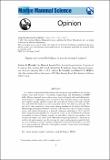Files in this item
Equity and career-life balance in marine mammal science?
Item metadata
| dc.contributor.author | Hooker, Sascha K. | |
| dc.contributor.author | Simmons, Samantha E. | |
| dc.contributor.author | Stimpert, Alison K. | |
| dc.contributor.author | McDonald, Birgitte I. | |
| dc.date.accessioned | 2017-04-12T09:30:13Z | |
| dc.date.available | 2017-04-12T09:30:13Z | |
| dc.date.issued | 2017-07 | |
| dc.identifier | 249667683 | |
| dc.identifier | b84cd6d1-c00e-4d14-b34a-4c07b3074060 | |
| dc.identifier | 85018566594 | |
| dc.identifier | 000406078400018 | |
| dc.identifier.citation | Hooker , S K , Simmons , S E , Stimpert , A K & McDonald , B I 2017 , ' Equity and career-life balance in marine mammal science? ' , Marine Mammal Science , vol. 33 , no. 3 , pp. 955-965 . https://doi.org/10.1111/mms.12407 | en |
| dc.identifier.issn | 1748-7692 | |
| dc.identifier.other | Bibtex: urn:093cb8587d021c1dc94a12cfb42c68a7 | |
| dc.identifier.other | ORCID: /0000-0002-7518-3548/work/47136148 | |
| dc.identifier.uri | https://hdl.handle.net/10023/10613 | |
| dc.description.abstract | It is widely acknowledged that family and care-giving responsibilities are driving women away from Science, Technology, Engineering, and Mathematics (STEM) fields. Marine mammal science often incurs heavy fieldwork and travel obligations, which make it a challenging career in which to find work-life balance. This opinion piece explores gender equality, equity (the principles of fairness that lead to equality), and work-life balance in science generally and in this field in particular. We aim to (1) raise awareness of these issues among members of the Society for Marine Mammalogy; (2) explore members’ attitudes and viewpoints collected from an online survey and further discussion at a biennial conference workshop in 2015; and (3) make suggestions for members to consider for action, or for the Board of Governors to consider in terms of changes to policy or procedures. Leaks in our pipeline—the attrition of women, and others with additional caring responsibilities—represent an intellectual and economic loss. By striving for equity and promoting work-life balance, we will help to ensure a healthy and productive Society better able to succeed in its aims promoting education, high quality research, conservation, and management of marine mammals. | |
| dc.format.extent | 11 | |
| dc.format.extent | 504833 | |
| dc.language.iso | eng | |
| dc.relation.ispartof | Marine Mammal Science | en |
| dc.subject | Gender | en |
| dc.subject | Equality | en |
| dc.subject | Leadership | en |
| dc.subject | Work-life balance | en |
| dc.subject | STEM | en |
| dc.subject | QH301 Biology | en |
| dc.subject | H Social Sciences (General) | en |
| dc.subject | HQ The family. Marriage. Woman | en |
| dc.subject | NDAS | en |
| dc.subject | SDG 5 - Gender Equality | en |
| dc.subject | SDG 10 - Reduced Inequalities | en |
| dc.subject | SDG 14 - Life Below Water | en |
| dc.subject.lcc | QH301 | en |
| dc.subject.lcc | H1 | en |
| dc.subject.lcc | HQ | en |
| dc.title | Equity and career-life balance in marine mammal science? | en |
| dc.type | Journal article | en |
| dc.contributor.institution | University of St Andrews. School of Biology | en |
| dc.contributor.institution | University of St Andrews. Marine Alliance for Science & Technology Scotland | en |
| dc.contributor.institution | University of St Andrews. Scottish Oceans Institute | en |
| dc.contributor.institution | University of St Andrews. Institute of Behavioural and Neural Sciences | en |
| dc.contributor.institution | University of St Andrews. St Andrews Sustainability Institute | en |
| dc.contributor.institution | University of St Andrews. Sea Mammal Research Unit | en |
| dc.identifier.doi | 10.1111/mms.12407 | |
| dc.description.status | Peer reviewed | en |
| dc.identifier.url | http://onlinelibrary.wiley.com/doi/10.1111/mms.12407/full#footer-support-info | en |
This item appears in the following Collection(s)
Items in the St Andrews Research Repository are protected by copyright, with all rights reserved, unless otherwise indicated.

